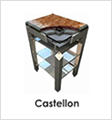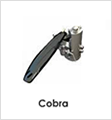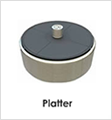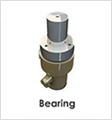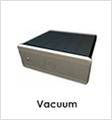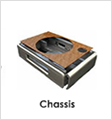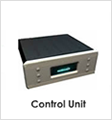

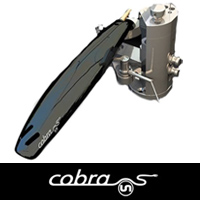
Caliburn Turntable |
Cobra Tonearm
Dig That Groove!
Take any concept that you had about what makes a great turntable, throw the idea of having a conventional tonearm right out of the window, runs it over with a truck... twice. A complex shape and choice of materials demonstrates a departure from the norm in the commercially available alternatives.
Just as Caliburn, the turntable, revolutionised turntable design by use of FEA software and shape optimisation, so too Continuum Audio Laboratories has used the same software technology to derive the new shape and performance parameters of the potent Cobra tonearm.
By taking the design and aesthetic constraints off the prototype modelling, we instructed the software to achieve infinite stiffness with lowest mass.
Ideal parameters in a virtual world not limited by manufacturing constraints.
The resulting Cobra-like shape appears counter-intuitive at first glance. Yes the shape appears large and heavy but it isn’t.
When one considers that every increase in width or height increases stiffness by a factor of close to 8 times then the size of the arm becomes a design requirement.
Materials
Choice of materials was also left open and we evaluated commonly available materials including aluminium oxide (“ceramic”) fuel cell tubes used in the fuel industry.
Problems included how to make a one-piece assembly from headshell to counterweight.
The result is a single unitary piece of arm technology which is lightweight but extremely stiff.
The force required to bend the Cobra would deform most commercially available arms, including titanium and magnesium arms, and would seriously damage multi piece arms.
The key to the Cobra’s arm stiffness is its shape and choice of materials.
Technical Details
Now for the pivot technology. We recognise linear tracking is the ultimate solution but see some designs have issues with “crabbing” where the arm “wiggles” its way across the linear path in a series of short arcs.
Our choice was to use a jewel pivot as found in the finest of aircraft instruments, which offer the lowest friction possible via mechanical means.
Stabilisation is via outrigger pivot, which allows for precise azimuth adjustment.
VTA is adjustable on the fly using a 40TPI microscope fine pitch thread vertical adjustment mechanism.
Clamping is by a triangulated locking system which avoids the common problem of using a “grub” screw to tighten against a shaft, which leaves micro movement to blur the information processing.
The Cobra will accept cartridges of 4 grams to 20 grams (wide range to accept any cartridge currently available) weight by means of a mass loading counterweight that does not shift forward and aft.
It uses a simple weight addition or subtraction method to keep the effective mass at the optimum for the arm.
The Antiskate mechanism, which is currently undergoing patent application, represents a unique solution to the skating force problem, by increasing the anti-skating force from 8% (of VTF) at the inrun groove to 12% (of VTF) at the innermost groove.
Technical Specifications
Pivot to Spindle Distance 221.7 mm
Accepts standard Cartridge centers of 12.7mm and 14mm long slot allows for correct overhang adjustment of any currently available cartridge.
VTA adjustment – on the fly
Azimuth - Adjustable
Antiskate – Adjustable
|


